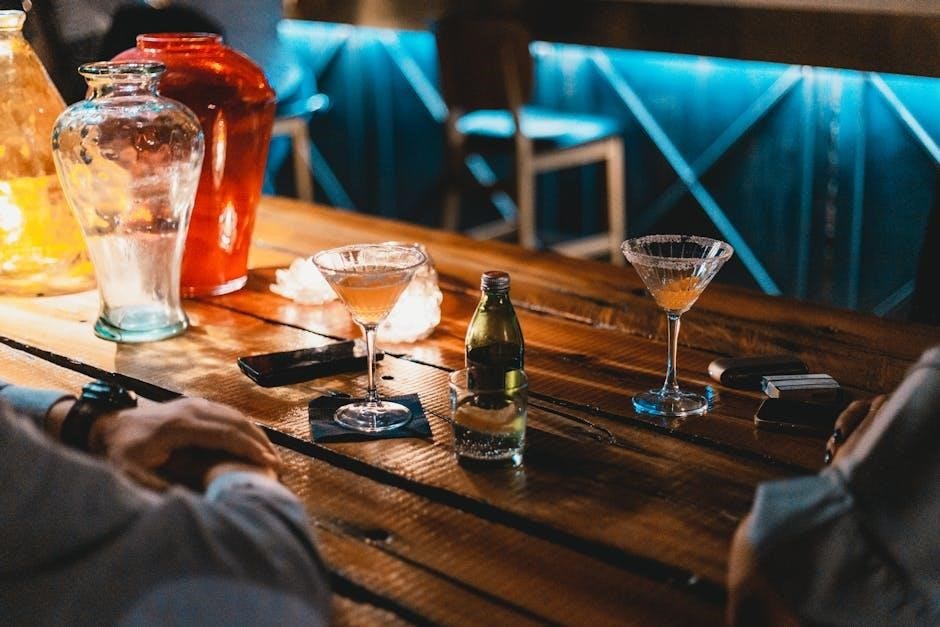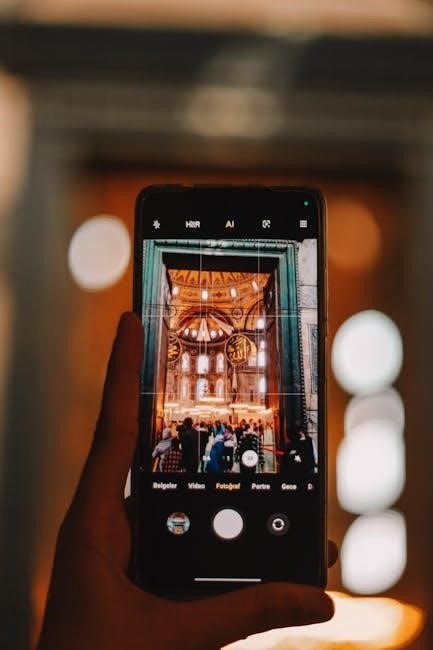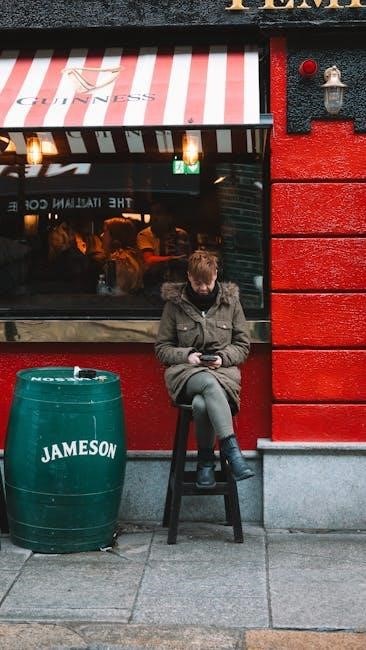mobile bar pricing guide
Discover the essential strategies for pricing your mobile bar services effectively. Learn how to structure packages, manage costs, and maximize profitability in the competitive event industry.
1.1 Understanding the Mobile Bar Industry
The mobile bar industry has grown significantly, offering flexible beverage solutions for events. It caters to weddings, corporate functions, and private parties, providing tailored services. Pricing varies based on event type, location, and menu options. Basic setups start around $300-$600, while luxury options can exceed $1,000. The industry requires balancing costs, such as inventory and staffing, with client expectations. Understanding these dynamics is crucial for setting competitive rates and ensuring profitability. This guide helps navigate the complexities of pricing in the mobile bar sector effectively.
1.2 Importance of Pricing in Mobile Bar Services
Pricing plays a pivotal role in the success of mobile bar services. It directly impacts profitability, client perception, and competitiveness. Accurate pricing ensures covering costs like equipment, staff, and inventory while reflecting service quality. Transparent pricing builds trust, while competitive rates attract clients. A well-structured pricing strategy helps businesses stand out in the market, ensuring long-term sustainability. This section highlights the key factors to consider when setting prices to achieve financial stability and customer satisfaction in the mobile bar industry.

Average Pricing for Mobile Bar Services
Mobile bar pricing typically ranges from $500 to $2,000+, depending on services, event size, and location. Basic setups start at $300-$700, while full-service events cost more.
2.1 Basic Setup Costs
Basic setup costs for mobile bar services typically include equipment rental, transportation, and initial setup fees. These costs generally range from $300 to $700, depending on the provider and location. This covers essential items like bar counters, coolers, glassware, and basic mixers. Some companies may charge extra for delivery or equipment assembly; These costs serve as the foundation for further customizations, such as staffing or beverage packages, which are billed separately based on event requirements and duration. Always inquire about what’s included to avoid hidden charges.
2.2 Average Event Pricing Ranges
Average pricing for mobile bar services varies based on event size and duration. Small events (up to 50 guests) typically range from $800 to $1,500, while medium events (50-100 guests) cost between $1,200 and $2,500. Larger events (100+ guests) can range from $2,000 to $5,000 or more, depending on the services required. These estimates include staffing, beverages, and equipment. Custom packages and premium options may increase costs. Always discuss event specifics with providers to get an accurate quote.
Factors Influencing Mobile Bar Pricing
Event size, location, menu options, and staffing needs significantly impact pricing. Larger events, remote venues, and premium beverages increase costs, while smaller gatherings may reduce expenses.
3.1 Event Type and Size
Event type and size are crucial pricing factors. Weddings, corporate events, and private parties vary in scale, affecting staffing and beverage requirements. Larger events demand more resources, increasing costs, while smaller gatherings may allow for simplified setups. The number of guests directly impacts drink consumption and service duration, influencing pricing structures. Additionally, event complexity, such as themed parties or VIP services, can elevate costs. Understanding these dynamics helps tailor pricing to meet client needs effectively while ensuring profitability.
3.2 Location and Venue
Location and venue significantly impact mobile bar pricing. Urban areas may have higher rental fees, while rural locations could require additional transportation costs. Venue size and accessibility also play a role; larger spaces or remote locations may demand more equipment and staff. Additionally, venues with limited amenities, such as water or electricity, may increase setup costs. Upscale venues might also require premium services, further influencing pricing. These factors ensure tailored solutions to fit both the location and client expectations, balancing convenience and cost-effectiveness.
3.3 Menu and Beverage Options
Menu and beverage options play a crucial role in determining mobile bar pricing. Offering a wide range of drinks, from standard cocktails to premium beverages, can significantly increase costs due to higher-quality ingredients and skilled mixologists. Custom cocktail menus or specialty drinks may also raise prices, as they often require unique ingredients and expertise. Additionally, including non-alcoholic options or catering to dietary preferences can add to the overall expense. These choices must be balanced to ensure they align with client expectations and budget constraints while maintaining profitability.
3.4 Staffing and Service Requirements
Staffing and service requirements significantly impact mobile bar pricing. The number of staff needed depends on the event size and complexity, with larger events requiring more bartenders, servers, and support personnel. Experienced staff, including professional mixologists or event managers, can increase costs. Additionally, the level of service—such as full-service bartending, setup, and cleanup—ffects pricing. Some clients may also request specialized services like flair bartending or personalized drink creation. These factors must be balanced with client budgets to ensure profitability while delivering exceptional service.
Types of Mobile Bars and Their Pricing
Mobile bars vary in style and offerings, from portable setups to luxury and specialty options, each catering to different event needs and budgets effectively.
4.1 Portable Bar Setups
Portable bar setups are lightweight, easy to transport, and quick to assemble, making them ideal for small to medium-sized events. These compact bars often include basic equipment like counters, coolers, and shelving, with pricing starting around $300-$700 for setup and staffing. They are perfect for intimate gatherings, outdoor events, or venues with limited space. Portable bars offer flexibility and affordability without compromising on service quality, allowing hosts to create a professional yet casual drink service experience tailored to their event needs and budget constraints effectively.
4.2 Luxury and Specialty Bars
Luxury and specialty bars cater to high-end events, offering premium services and exclusive beverages. These setups often include professional mixologists, gourmet cocktails, and high-quality spirits. Pricing ranges from $1,200 to $3,000 or more, depending on event size and duration. Specialty bars, such as wine or champagne bars, focus on specific drinks, enhancing the sophistication of the event. These options are ideal for weddings, corporate events, or galas, providing an elevated experience that reflects the host’s commitment to excellence and exclusivity, making them a worthwhile investment for discerning clients seeking unique, memorable experiences.
4.3 Event-Specific Bar Packages
Event-specific bar packages are tailored to meet the unique needs of different occasions, such as weddings, corporate events, or holiday parties. These packages often include themed cocktails, exclusive drink menus, and customized service options. Pricing typically ranges from $800 to $2,500, depending on the event scale and complexity. Add-ons like signature drinks or personalized glassware enhance the experience. These packages offer a one-stop solution, ensuring a seamless and memorable bar service that aligns perfectly with the event’s theme and client preferences, providing exceptional value and convenience for hosts and planners alike.

Creating Mobile Bar Packages
Designing mobile bar packages involves understanding client needs, customizing drink options, and balancing quality with affordability to create appealing, tailored solutions for various events and preferences.
5.1 Customizing Packages for Different Events
Customizing mobile bar packages for different events ensures tailored experiences. For weddings, premium cocktails and signature drinks are popular, while corporate events may favor classic mixes. Understanding event themes, guest preferences, and budget constraints allows for personalized beverage selections and service styles. Offering flexibility in package design helps meet diverse client needs, ensuring satisfaction and repeat business. This approach balances quality, variety, and cost-effectiveness, making your mobile bar stand out in a competitive market.
5.2 Pricing Strategies for Packages
Effective pricing strategies for mobile bar packages involve balancing profitability and client appeal. Tiered pricing offers flexibility, with options like basic, premium, and luxury tiers. Value-based pricing highlights the quality and exclusivity of services, while cost-plus pricing ensures profit margins. Competitive pricing aligns with market rates to attract clients. Clearly communicating package inclusions and benefits helps justify prices. Offering discounts for bulk orders or off-season bookings can also drive sales. Transparent and adaptable pricing strategies build trust and cater to diverse client budgets and preferences.
5.3 Including Add-On Services
Including add-on services enhances package offerings and increases revenue. Popular add-ons include premium cocktail menus, personalized mixologists, or gourmet food pairings. These extras allow clients to customize their experience, adding value to the event. Optional services like custom glassware, themed setups, or extended service hours can also be offered. Clearly presenting these add-ons ensures clients understand their benefits, making packages more appealing. Bundling add-ons strategically can boost sales while maintaining flexibility for clients with varying budgets and preferences.

Setting the Right Price for Your Services
Pricing must balance profitability with client affordability. Analyze costs, demand, and competition to set fair rates. Adjust based on event specifics and client feedback to ensure satisfaction.
6.1 Calculating Costs and Profit Margins
To set accurate prices, calculate all operational costs, including equipment, inventory, and staffing. Determine profit margins by adding a percentage to cover overheads and desired income. Consider variable expenses like transportation and event-specific supplies. Track past events to identify cost patterns and optimize pricing. Ensure margins align with industry standards while reflecting the value provided. Regularly review financial data to adjust pricing strategies and maintain profitability; This step ensures sustainability and long-term success in the mobile bar business.
6.2 Competitive Analysis
Conducting a competitive analysis is crucial for pricing your mobile bar services. Research local competitors, their pricing structures, and service offerings. Identify what sets your business apart, such as unique cocktails or exceptional customer service. Analyze how competitors price based on event size, location, and menu options. Use this data to position your pricing strategically—whether premium, mid-range, or budget-friendly. Stay informed about market trends and adjust your pricing accordingly to remain competitive while reflecting your brand’s value proposition.
6.3 Client Budget Considerations
Understanding client budgets is essential for pricing your mobile bar services effectively. Offer tiered packages to cater to different budget levels, ensuring affordability without compromising quality. Provide custom quotes based on event specifics, such as guest count and beverage selection. Be transparent about costs to build trust and avoid surprises. Consider offering flexible payment options or value-added services to enhance perceived value. Tailoring your pricing to meet client needs while staying within their budget constraints fosters long-term relationships and repeat business.

Managing Revenue and Costs
Effectively managing revenue and costs ensures profitability. Track income, control expenses, and optimize resources to maintain financial health and sustain growth in your mobile bar business.
7.1 Effective Inventory Management
Efficient inventory management is crucial for mobile bar profitability. Track stock levels, monitor usage, and reorder supplies strategically to avoid overstocking or shortages. Implement a robust inventory system to ensure accurate counts and reduce waste. Regular audits help identify discrepancies and optimize purchasing decisions. Maintain strong relationships with suppliers to secure reliable deliveries and competitive pricing; By streamlining inventory processes, you can minimize costs, improve service efficiency, and maximize profitability, ensuring your mobile bar operates smoothly during events.
7.2 Minimizing Waste and Loss
Minimizing waste and loss is essential for maintaining profitability in mobile bar operations. Implement measures like monitoring expiration dates, using precise pour measures, and training staff to reduce spillage. Offer specials on slow-moving items to prevent inventory from going to waste. Use data from past events to forecast demand accurately, avoiding overstocking. Regularly audit stock to identify and address inefficiencies. By reducing waste, you can lower operational costs, enhance sustainability, and improve overall profitability, ensuring your mobile bar remains financially healthy and competitive in the market.
7.3 Optimizing Staffing Costs
Optimizing staffing costs involves balancing service quality with financial efficiency. Cross-train staff to handle multiple roles, reducing the need for additional hires. Implement flexible scheduling based on event demand, ensuring adequate coverage without overstaffing. Consider hourly versus flat-rate payments to align costs with event duration. Hire part-time or freelance workers for peak periods to avoid full-time commitments. Use scheduling software to track labor hours and minimize overtime. Train staff to work efficiently, reducing labor-intensive tasks and enhancing overall productivity, which helps maintain profitability while delivering excellent service.

Marketing and Promoting Your Pricing
Effectively market your pricing by highlighting unique selling points, such as premium services or exclusive packages, to attract potential clients and justify your pricing structure clearly.
8.1 Attractive Package Presentation
Present your pricing packages in an appealing and organized manner to capture clients’ attention. Use high-quality images, clear descriptions, and structured layouts to showcase offerings. Highlight unique add-ons like signature cocktails or themed setups to differentiate your services. Ensure package details are easy to compare, emphasizing value and exclusivity. Transparent pricing builds trust, while visually appealing presentations make your mobile bar stand out, appealing to both budget-conscious and premium clients. This approach helps potential customers quickly understand the benefits of each package, making decision-making easier and more engaging.
8.2 Transparent Pricing Policies
Transparency in pricing is crucial for building trust with clients. Clearly outline all costs, including setup fees, drink prices, and service charges, to avoid misunderstandings. Provide detailed breakdowns of what’s included in each package, such as the number of drinks, staff hours, and equipment. Avoid hidden fees and ensure clients understand the total cost upfront. Transparent policies not only foster credibility but also encourage long-term relationships and positive referrals. This approach helps clients feel confident in their decisions, knowing they’re getting fair value for their investment.
8.3 Seasonal Pricing Adjustments
Adjusting prices seasonally can help maximize revenue and adapt to market demands. During peak event seasons, such as summer or holidays, higher rates may apply due to increased demand. In slower periods, consider offering discounts or promotions to attract bookings. Flexibility in pricing allows you to capitalize on high-demand times while maintaining competitiveness during low-demand periods. Seasonal adjustments should align with your business goals and client expectations, ensuring profitability while remaining appealing to customers. This strategy helps balance revenue and client satisfaction throughout the year.

Financial Forecasting for Your Mobile Bar
Financial forecasting predicts future revenue and expenses, aiding strategic planning. By analyzing historical data and market trends, it ensures informed decisions and sustainable profitability for your mobile bar.
9.1 Assessing Future Profitability
Assessing future profitability involves predicting revenue and expenses based on historical data and market trends. By analyzing pricing strategies, cost management, and customer demand, you can estimate potential earnings and identify areas for improvement. This process helps in setting realistic financial goals and ensuring long-term sustainability for your mobile bar business. Regular financial assessments allow for timely adjustments to pricing, inventory, and staffing, optimizing profitability in a competitive market.
9.2 Cash Flow Management
Cash flow management is essential for maintaining liquidity and ensuring smooth operations. Monitor revenue from events, deposits, and final payments to anticipate income. Track expenses, such as inventory, staffing, and equipment, to prevent overspending. Implement strategies like flexible payment terms or seasonal pricing to stabilize cash flow. Regularly review financial statements to identify trends and adjust budgets accordingly. Maintaining a cash reserve can help cover unexpected costs or slow periods, ensuring your mobile bar remains financially stable and prepared for growth.
9.4 Using Tools for Financial Planning
Utilizing financial planning tools is crucial for optimizing your mobile bar’s financial health. Implement software like QuickBooks or Xero for accounting and budgeting. Tools like Google Sheets or specialized apps can help create detailed budgets and forecasts. Additionally, consider inventory management systems to track expenses and revenue. Analytics tools can provide insights into spending patterns and profitability. These resources enable precise financial planning, helping you make informed decisions and ensure long-term sustainability for your mobile bar business.

Legal and Operational Considerations
Understanding legal requirements and operational logistics is essential for a mobile bar business, ensuring compliance with regulations and maintaining smooth service delivery.
10.1 Licensing and Permits
Obtaining the necessary licenses and permits is crucial for operating a mobile bar legally. These include liquor licenses, food handling permits, and event-specific authorizations. Requirements vary by location, so research local regulations thoroughly. Ensure compliance with health and safety standards, as well as any venue-specific permits. Failure to secure proper documentation can result in fines or business closure. Always verify licensing needs before offering services in a new area to maintain legality and avoid operational disruptions.
10.2 Insurance Requirements
Insurance is essential for protecting your mobile bar business from potential risks. General liability insurance covers accidents or damages during events, while liquor liability insurance is mandatory for serving alcohol. Commercial auto insurance is needed if you transport equipment or staff. Additionally, consider event-specific insurance for one-off gatherings and workers’ compensation if you employ staff. Ensure all policies align with your business scale and event types to avoid financial losses. Consulting an insurance expert can help tailor coverage to your needs.
10.3 Contractual Agreements
Clear contractual agreements are vital for protecting your mobile bar business and clients. Contracts should outline payment terms, cancellation policies, and the scope of services. Include clauses for delivery timelines, service expectations, and termination conditions. Ensure both parties understand their responsibilities and liabilities. Having a legally binding agreement helps prevent disputes and ensures smooth operations. Always consult a legal expert to draft or review contracts before finalizing them with clients or vendors.

Tips for a Successful Mobile Bar Business
Focus on exceptional customer service, adaptability, and quality offerings to build a loyal client base and ensure repeat business and referrals.
11.1 Building Client Relationships
Building strong client relationships is crucial for long-term success. Focus on personalized communication, understanding client preferences, and delivering tailored solutions. Be responsive to inquiries and adaptable to their needs. Offer referral incentives and maintain consistent follow-up after events to ensure satisfaction and gather feedback. By fostering trust and reliability, you create loyal clients who will advocate for your services and return for future events.
11.2 Adapting to Market Trends
Adapting to market trends ensures your mobile bar remains competitive. Stay informed about popular drink styles, industry innovations, and consumer preferences. Invest in trends like craft cocktails or sustainable practices to attract modern clients. Monitor competitors and adjust pricing or services accordingly. Engage with industry networks and attend workshops to stay updated. Flexibility in offerings and pricing can help you capitalize on emerging opportunities, ensuring your business evolves with changing demands and remains relevant in a dynamic market.
11.3 Continuous Improvement Strategies
Continuous improvement strategies are essential for long-term success in the mobile bar industry. Regularly assess operations, gather client feedback, and analyze performance metrics to identify areas for enhancement. Implement small, incremental changes to refine services, improve efficiency, and elevate customer satisfaction. Stay updated on industry best practices and adapt to evolving standards. Encourage a culture of ongoing learning and innovation within your team. By committing to continuous improvement, your mobile bar business can maintain high standards, stay competitive, and consistently deliver exceptional experiences.

12.1 Final Thoughts on Pricing Strategy
Developing a pricing strategy for your mobile bar requires balancing profitability with client expectations. Consider event specifics, competition, and costs to set competitive yet sustainable rates. Regularly review financials and client feedback to refine your approach. Transparency and flexibility in pricing can enhance trust and attract diverse clientele. By aligning your strategy with market demands and business goals, you can ensure long-term success in the mobile bar industry.
12.2 Implementing Your Pricing Plan
Successfully implementing your pricing plan involves clear communication, structured payment terms, and alignment with client expectations. Use pricing tools to track profitability and ensure transparency in billing. Regularly review and adjust pricing based on demand and costs. Train staff to explain pricing clearly and handle client inquiries confidently. By maintaining flexibility and ensuring pricing reflects your brand’s value, you can build trust and loyalty with clients while achieving business goals.